
Contents
Executive summary
- For the third year running, in late 2022 we surveyed members of the European Parliament (MEPs) about their views on new nicotine products – e-cigarettes, heated tobacco and nicotine pouches.
- Their opinions are particularly important given that major European Union regulation of the sector is expected, notably a Tobacco Excise Directive and a revision of the Tobacco Products Directive.
- Very few MEPs consider that new nicotine products should be more restricted by law than traditional tobacco, and a majority believe online sales should be allowed for adults (with age verification). But a growing number are unsure.
- Indeed, MEPs appear to be broadly less likely than in previous years to express firm views in favour of or against new nicotine products. For example, MEPs with no knowledge of new nicotine products are becoming far more likely to acknowledge that they don’t know the risks.
- This trend towards uncertainty suggests either that MEPs are less confident about their level of knowledge on the topic, or that they recognise it is increasingly controversial and politicised.
- A narrow majority of MEP responses regard new nicotine products as less harmful than smoking, and only a small minority (19%) consider them equally harmful to smoking. But again, many are unsure.
- The level of knowledge that MEPs have of these products appears to be a factor in their views on them. For example, those with knowledge of new nicotine products generally see them as less risky, compared with those lacking knowledge.
Perceptions of risk compared to smoking
A small majority of MEP responses (consolidated across the three product types) regard new nicotine products as less harmful than smoking, with a slight year-on-year increase to 54%.
Meanwhile, MEP responses saying that new nicotine products are at least as risky as smoking have declined compared to previous years, at 19% in 2022.
However, the number of responses saying they don’t know about the risk of these products has increased to over 25%.
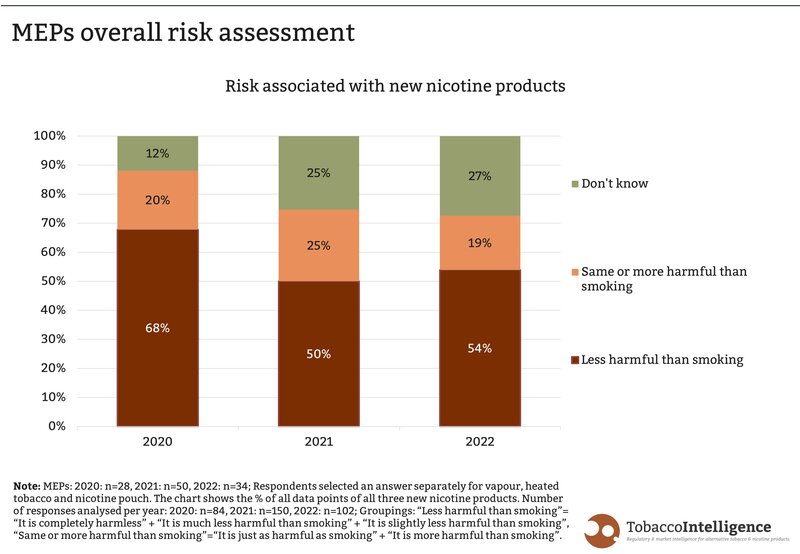
Knowledge as a factor in risk perception
As in previous years, MEPs who have some knowledge of new nicotine products are much more likely to consider them less harmful than smoking, when compared to MEPs who have no knowledge or awareness of the products.
For example, more than three-quarters of responses from MEPs with knowledge say the products are less harmful than smoking, and only 4% of these responses say they don’t know about the risk.
Conversely, MEPs with no knowledge of the products are much more likely to be unsure of the risks. And among this group with no knowledge, uncertainty about the risks is growing; this contrasts with previous years, when MEPs had been more willing to adopt a position in one direction or the other.
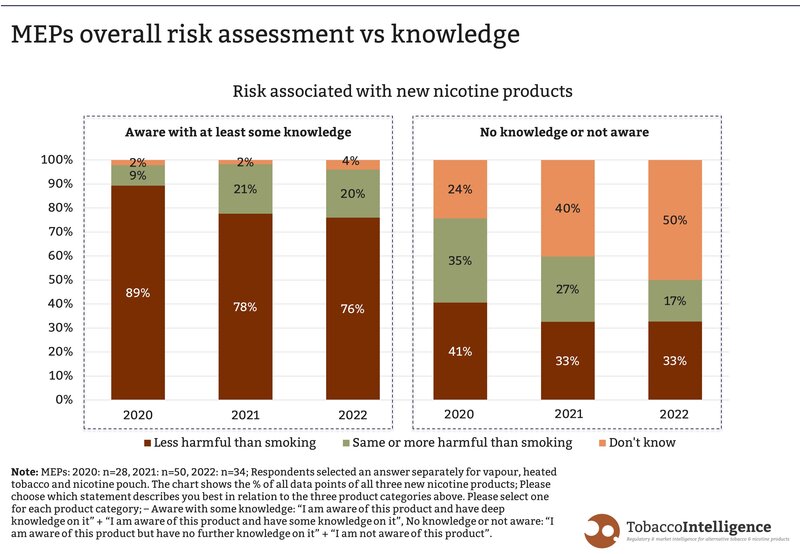
Perceptions of risks in individual product categories
As well as knowledge leading to apparent confidence in overall opinions on risk, MEPs also tend to be more confident in assessing the risk of specific product categories about which they have knowledge.
Among MEPs who felt they did have knowledge of particular product categories, none were unsure about the risks presented by pouches or heated tobacco.
But 11% (up from 4% in 2021) of responses from MEPs with knowledge nevertheless said they were unsure about the risks of vapour. This likely reflects the growth of disposable vape products in the EU, and the perceived risk these products present.
Among those with no knowledge of new nicotine products, a much greater proportion of MEPs do not know the risks. In all three categories – vapour, heated tobacco and nicotine pouches – 40% or more said they were unsure.
Nicotine pouches were the products where a lack of knowledge was most likely to lead to uncertainty about risk, earning the highest proportion of “don’t knows” among MEPs with no knowledge. However, they also had the lowest proportion of MEPs considering them to be as risky as or more harmful than smoking, and this proportion has decreased significantly from previous years.
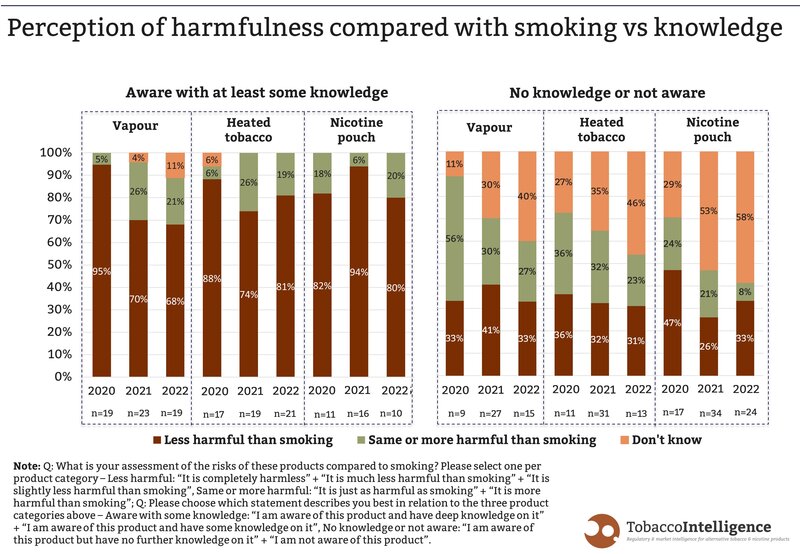
Perceptions of effects on smoking behaviour
MEPs’ opinions about the inherent risks of new nicotine products are somewhat correlated to their opinions on whether these products lead to smoking or enable quitting.
Indeed, it is possible that some of them factored the chance of a user progressing to – or giving up – smoking into their overall risk assessment.
Thus, those MEPs who say new nicotine products are an “on-ramp” problem (i.e. they lead non-smokers into smoking cigarettes) are more likely to consider that they are as harmful as smoking. But even so, a majority still say they are less harmful than smoking.
And a huge majority of those MEPs who consider the products promote “off-ramp” behaviour (i.e. they offer a way out of smoking) also consider that they are less harmful than smoking (89% of responses). Moreover, far fewer of this group are unclear about the risk of these products compared to the previous year.
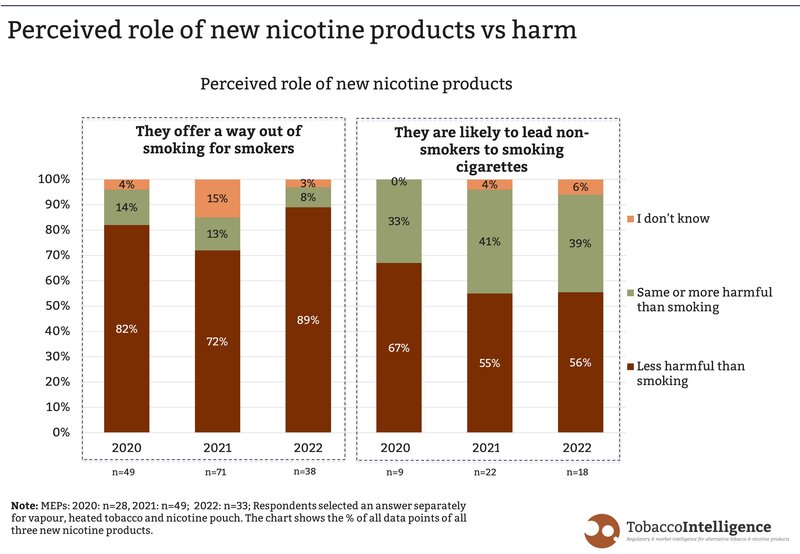
Opinions on regulation of new nicotine products
Very few MEPs consider new nicotine products should have more restrictions applied to them than traditional tobacco.
However, once again, uncertainty seems to be growing. The proportion of responses suggesting new nicotine products should have less restrictions than traditional tobacco has declined, replaced by MEP responses saying they don’t know.
A majority of MEP responses still consider sales of new nicotine products should be allowed to be carried out online; again, though, this is declining compared to previous years, and a growing number of MEPs are unsure whether online sales should be permitted.
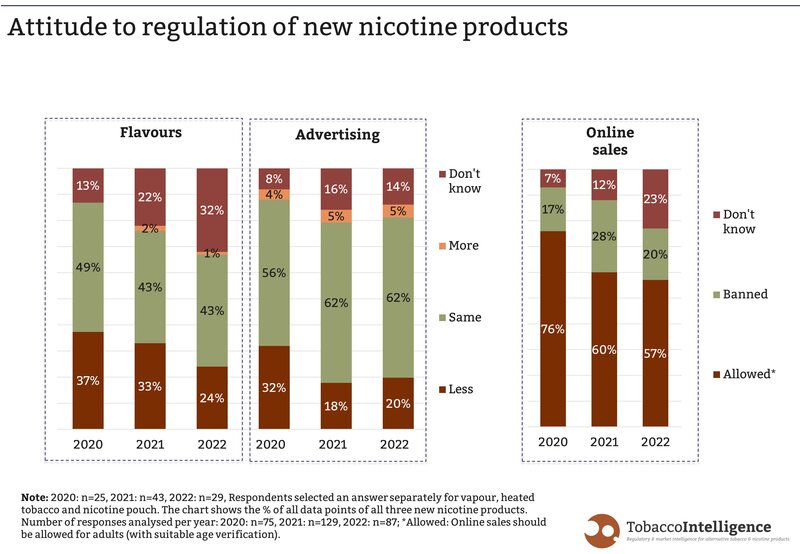
Perceptions of nicotine itself
This question focused on the substance nicotine itself. It was asked because one of the main arguments put forward in support of novel nicotine products is that the harms caused by smoking mostly derive from the process of combustion, not from the nicotine itself.
MEP responses agreeing that nicotine itself is as harmful as tobacco have decreased by almost half compared to the previous year, but those who disagree has also decreased.
Yet again, there has been a sharp increase in the number of MEPs who are neutral or don’t know whether nicotine is as harmful as tobacco, suggesting a gap in the knowledge required by MEPs when they are asked to vote on regulation of new nicotine products in the future.
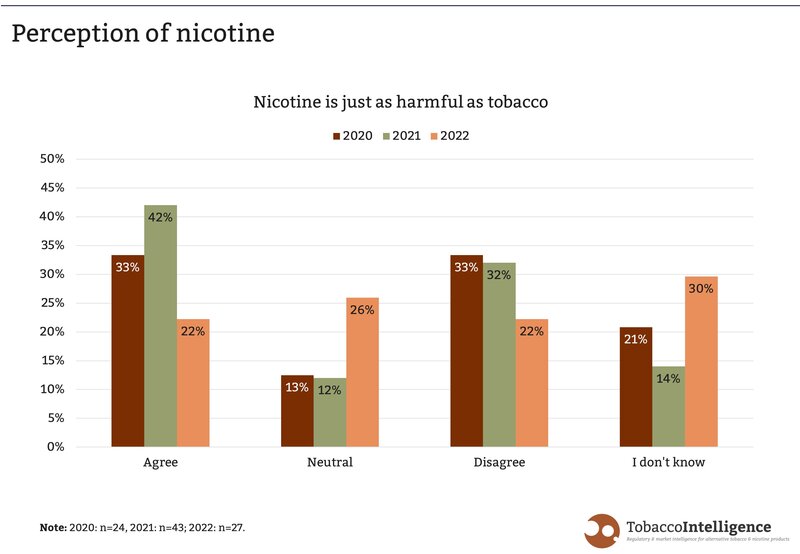
Methodology
A third survey of MEPs to find out how their views have changed on new nicotine products was conducted by Tamarind Intelligence, publisher of ECigIntelligence and TobaccoIntelligence, following similar surveys carried out in 2020 and 2021.
The survey was carried out online and anonymously using the same methodology and questions as previous years, allowing comparison of the results. All the data obtained remains confidential other than in consolidated analysis. The survey was sent to all MEPs (from all member states and political parties) and responses were obtained from 43 MEPs, representing 6% of the European Parliament.
– TobaccoIntelligence staff
Photo: Wikimedia Commons







